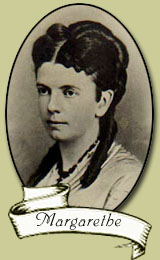

Prominent Wisconsin Forty-Eighters
Carl Schurz (1829-1906): The most famous and influential of the Wisconsin 48ers. In 1848, Schurz led students at the University of Bonn against Kaiser Frederick Wilhelm IV's regime and became a lieutenant in the revolutionary army. After the failed revolution, Schurz fled to Paris (he also made a daring return to Germany under a false passport to rescue a professor from the Spandau prison). After living in New York and Philadelphia, Schurz and his wife, Margarethe Meyer Schurz, came to Wisconsin in 1855, first settling in Watertown. In America, Schurz continued his political activism. In Wisconsin and elsewhere, he championed freedom and anti-slavery ideals, often using his journalism background to speak his mind. Also, Schurz became known as a leading spokesman for the newly formed Republican party.
Highlights of his political and public career include:
- 1857: Unsuccessful bid for lieutenant governor. Starts the Watertown Advertiser, a newspaper that would "advocate anti-slavery principles"
- 1859: Sets up legal practice in Milwaukee
- 1860: Heads Wisconsin delegation to Republican convention
- 1861: Appointed minister to Spain by President Lincoln
- 1862: Fights in Civil War in General Freemont's Virginia division
- 1869: Elected U.S. Senator from Missouri
- 1877-1881: Serves as Secretary of the Interior
- 1882: Helps found New York Evening Post
- 1892-1895: President of the National Civil Service Reform League
- 1892-1898: Writes editorials for Harper's Weekly
Margarethe Meyer Schurz (1833-1876): Margarethe Meyer met Carl Schurz in London in 1852 and moved to New York with him as his wife later that year. While often in poor health, Margarethe Schurz played a crucial role in introducing the idea of kindergarten to America. She had long been interested in the work of Friedrich Froebel, the founder of the kindergarten movement. She had helped her sister with an experimental school in London before moving to America. In 1856, she used her home in Watertown, Wisconsin, as a kindergarten for her daughter and other neighborhood children. Her friend Elizabeth Peabody was so inspired by this model that she started the first public kindergartens in St. Louis.


Fritz Anneke (1818-1872): Playwright and poet, Fritz Anneke was involved in the leadership of the German Revolution. He and his wife Mathilde Franziska Anneke settled in Milwaukee in 1849. Fritz Anneke was involved in several reform newspapers, was a foreign correspondent during the Italian war in 1859, and was a colonel in the 34th Wisconsin Infantry during the Civil War.
Mathilde Franziska Anneke (1817-1884): Mathilde Anneke was a poet and playwright involved with a revolutionary newspaper in Germany. In America, Mathilde Anneke was a champion of woman's rights and a pioneer in the suffrage movement in Wisconsin. More on Mathilde Anneke and on the Suffrage Movement.
Edward Solomon (1830-1909): Edward Solomon studied at the University of Berlin and came to Wisconsin in 1849. He settled first in Manitowoc, and later ran a bar in Milwaukee. Solomon came to Wisconsin as a Democrat, but soon switched to Republicanism and supported the Emancipation Proclamation. In 1861, he was elected Lieutenant Governor. After Governor Louis Powell Henry drowned in a freak river accident while on his way to bring supplies to Civil War field hospitals, Solomon became Governor of Wisconsin in April of 1862. Over all, his was a failed administration. He could not get Germans--Republican or Democrat--to volunteer for the Civil War, but instead had to implement an unpopular draft that led to riots around the state. To his credit, he did give Wisconsin soldiers in the field the right to vote.
[Contributions of the '48ers] [Prominent '48ers] [German Revolution of 1848]
[The '48ers] [The
Republican Party] [Woman's Suffrage]
[Sources and Credits] [Wisconsin
Mosaic Home] [The Activists Home]